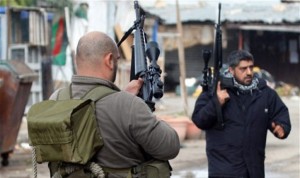 Foreign-backed militants operating in Syria (file photo)[/caption]
Foreign-backed militants operating in Syria (file photo)[/caption]Qom, Dec 9, IRNA � Senior Iranian cleric Ayatollah Abdollah Javadi Amoli�underlined that Takfiri groups in Syria are supported by the Zionism and the US.
�The main sponsors of Takfiri currents who are Zionists and the US should be identified while dealing with them,� Javadi Amoli said.
�We should know that the same ones who have supplied the Takfiris with weapons, only them can take them back from them,� he added.
Syria has been experiencing unrest since March 2011 with organized attacks by well-armed gangs against the Syrian police, border guards, statesmen, army and the civilians being reported across the country.
Thousands of people have been killed since terrorist and armed groups turned protest rallies into armed clashes.
The government blames outlaws, saboteurs, and armed terrorist groups for the deaths, stressing that the unrest is being orchestrated from abroad.
In October 2011, calm was almost restored in most parts of the Arab state after President Assad started a reform initiative in the country, but Israel, the US and its Arab allies brought the country into chaos through every possible means. Tel Aviv, Washington and some Arab capitals have been staging various plots in the hope of increasing unrests in Syria.
The US daily, Washington Post, reported in May, 2012 that the Syrian rebels and terrorist groups battling Assad?s government have received significantly more and better weapons in recent weeks, a crime paid for by the Persian Gulf Arab states and coordinated by the United States.
The newspaper, quoting opposition activists and US and foreign officials, reported that Obama administration officials emphasized the administration has expanded contacts with opposition military forces to provide the Persian Gulf nations with assessments of rebel credibility and command-and-control infrastructure.
According to the report, material was being stockpiled in Damascus, in Idlib near the Turkish border and in Zabadani on the Lebanese border.
Opposition activists who several months ago said the rebels were running out of ammunition said in May that the flow of weapons - most bought on the black market in neighboring countries or from elements of the Syrian military in the past - has significantly increased after a decision by Saudi Arabia, Qatar and other Persian Gulf states to provide millions of dollars in funding each month.
By IRNA
The Iran Project is not responsible for the content of quoted articles.










